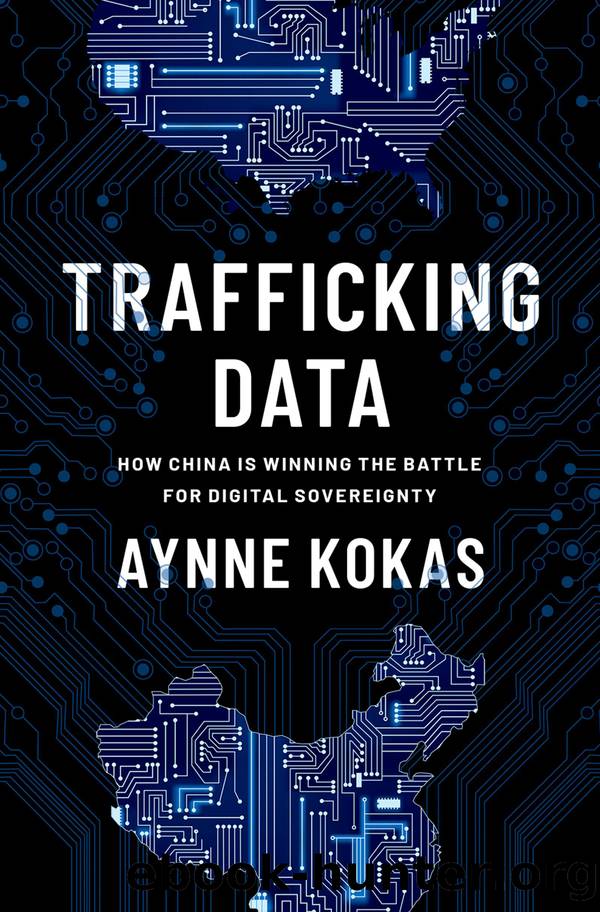Trafficking Data by Aynne Kokas

Author:Aynne Kokas
Language: eng
Format: epub
Publisher: Oxford University Press
Published: 2022-06-15T00:00:00+00:00
Home Appliances
Most people are not in the habit of monitoring whether they are consenting to data gathering when they eat, but some connected home devices even know when you open your refrigerator door. Beyond posing a conundrum for avid snackers, this kind of monitoring can also provide such data points as how many people might be at home at a given time, when mealtimes are, and which foods people eat. This issue of consumer data gathering on devices has particularly interesting data trafficking implications when companies change hands.
In August 2018, I served as the scholar liaison for a group of congressional staffers traveling to China on a delegation through the National Committee on US-China Relations. While we were in Qingdao, our hosts from the Qingdao Municipal Committee of the Chinese Communist Party invited our group to visit the consumer products company Haier, a firm best known in the United States for making inexpensive mini refrigerators.
Haier emerged from the state-run Qingdao Refrigerator General Factory as part of the first wave of liberalization in the 1980s.21 Haierâs chairman and CEO, Zhang Ruimin, who took over Haierâs leadership in 1984, has articulated clear plans for building a data platform and leveraging the IoT as part of a turnaround strategy for the electronics firm.22 Haier had its initial public offering in 1993, listing Class A sharesâshares for retail investorsâon the Shanghai Stock Exchange. In 2018, the firm listed Class D shares on Germanyâs China Europe International Exchange, or CEINEX, a joint venture of Chinese and German stock exchanges.23
Zhangâs role underscores Haierâs position as a key player in the CCPâs long-term strategic planning. In addition to being the company chairman and CEO, he was a delegate to the 19th National Congress of the CCP and an alternate delegate as far back as the 16th National Congress in 2002.24 Zhangâs long-standing role in CCP leadership, paired with Haierâs origins in the state-run sector, highlights the difference between this firm and other global appliance firms, such as Samsung, Electrolux, and Whirlpool.
Jet-lagged and exhausted, our group visited the Haier headquarters to learn about refrigerator manufacturing. We quickly recognized that Haier had transcended its refrigerator company origins. Instead of mini refrigerators, we saw connected home appliances with sensors to surveil usersâ daily lives. As we toured kitchen mock-ups studded with stainless steel devices, our hosts told us that Haier was now a tech company. The firmâs executives went on to note that not only was Haierâs brand growing in the United States, but the company had also acquired a US legacy brand, GE Appliances, one of the oldest and most trusted consumer brands in the United States.
In June 2016, Haier purchased GE Appliances for US$5.4 billion.25 Together, Haier and GE Appliances comprise the worldâs largest consumer appliance company.26 The acquisition specifically targeted growth through the IoT.27 Since purchasing GE Appliances, Haier has made good on this goal by delivering an entire line of connected consumer electronics called GE Smart Appliances.28 Data is gathered via the appliances and stored on apps developed by Haier US Appliance Solutions, Inc.
Download
This site does not store any files on its server. We only index and link to content provided by other sites. Please contact the content providers to delete copyright contents if any and email us, we'll remove relevant links or contents immediately.
The Secret History by Donna Tartt(16664)
The Social Justice Warrior Handbook by Lisa De Pasquale(11494)
Thirteen Reasons Why by Jay Asher(7803)
This Is How You Lose Her by Junot Diaz(5800)
Weapons of Math Destruction by Cathy O'Neil(5048)
Zero to One by Peter Thiel(4835)
The Myth of the Strong Leader by Archie Brown(4796)
Promise Me, Dad by Joe Biden(4459)
Beartown by Fredrik Backman(4435)
Stone's Rules by Roger Stone(4423)
How Democracies Die by Steven Levitsky & Daniel Ziblatt(4415)
The Fire Next Time by James Baldwin(4352)
100 Deadly Skills by Clint Emerson(4086)
A Higher Loyalty: Truth, Lies, and Leadership by James Comey(4041)
Rise and Kill First by Ronen Bergman(4022)
The David Icke Guide to the Global Conspiracy (and how to end it) by David Icke(3892)
The Farm by Tom Rob Smith(3878)
Secrecy World by Jake Bernstein(3790)
The Doomsday Machine by Daniel Ellsberg(3738)
